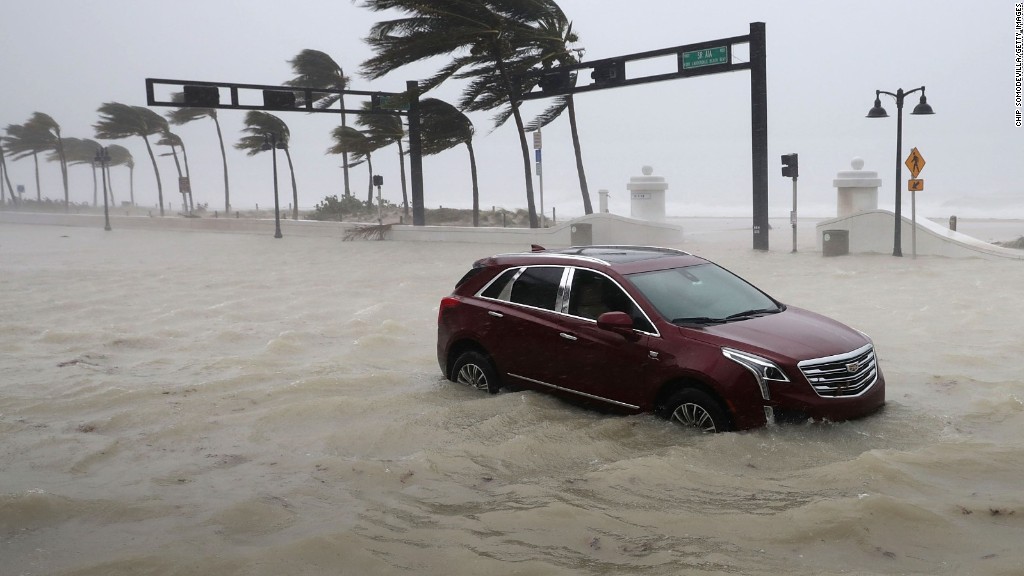
Despite its downgrade from a hurricane to a tropical storm, Irma disrupted air travel over a wide swath of the Southeast.
Atlanta Hartsfield-Jackson International Airport, the busiest airport in the world, was hit with extended rain and high winds from Irma on Monday while many of Florida's airports remained closed as officials assess damage and try clean up from the powerful storm.
Southwest Airlines (LUV), the second largest airline in Atlanta, said the winds were forcing the cancellation of all of its flights out of the airport after 1 p.m. ET. The carrier aims to resume normal operations there on Tuesday.
Atlanta-based Delta Air Lines (DAL)canceled about 900 flights Monday and said the storm could affect its catering options aboard aircraft leaving its biggest hub.
Delta and Southwest account for 81% of the flying in Atlanta, which sees 104 million passengers annually.
When will Florida's airports reopen?
The disruptions in Atlanta came as Florida's biggest airport picks up the pieces after taking a hit from Hurricane Irma.
Miami International Airport was closed on Monday after sustaining "significant water damage throughout," according to CEO Emilio Gonzalez. Gusts of 94 miles per hour were recorded there, he said.
Limited operations at the airport, the country's 12th largest, were set to resume at 7 a.m. on Tuesday, Gonzalez said on Twitter.
Miami airport's difficulties add to the transportation chaos Irma has inflicted on Florida residents. Thousands of flights in and out of Florida have been scrubbed over the past several days as Irma tracked its way across the Caribbean to the mainland U.S.
Miami's main airport doesn't know yet when it will reopen after Irma
The situation is a particular headache for American Airlines (AAL), the country's largest air carrier, which uses Miami as a major hub.
American said earlier Sunday that limited operations at its Miami hub would resume at 5 p.m. Monday, but that plan was shelved as the airport cleaned up from the storm.
Nearby Fort Lauderdale-Hollywood International Airport said Monday it would resume commercial operations Tuesday morning.
Many of Florida's other airports were still offline. Tampa's airport said it sustained "minimal damage" after recording sustained winds of 52 miles per hour and gusts up to 66 miles per hour as Irma blew through.
Tampa expected to restart commercial flights on Tuesday morning.
Gas shortage: Florida races to refill gas stations after Hurricane Irma
It was not immediately clear much damage the airports sustained and final losses to the airlines won't be calculated for some time. United Airlines (UAL) estimated that Hurricane Harvey, which slammed Houston and Texas' Gulf Coast last month, would account for about half of an anticipated 3% to 5% drop in its unit revenue during the third quarter.
Airlines can cushion some of the blow by re-deploying aircraft elsewhere in their network to keep their fleets productive, but idling a significant portion of its workforce in Florida adds to the financial impact. Depending on the pace of the recovery, another negative impact is a reduction of travel to and from Florida, a major tourist and business destination.
Airlines were already paying a higher price for fuel after Harvey, which significantly damaged refinery capacity in Houston. A Cowen & Co. report on Monday estimated oil prices have increased about 4% since Harvey "and could continue to remain elevated following Hurricane Irma's direct hit with South Florida," it said.
Any damage sustained to airport infrastructure like radars, control towers, instrument landing systems and lighting would likely be repaired using funds from the FAA operating budget.

